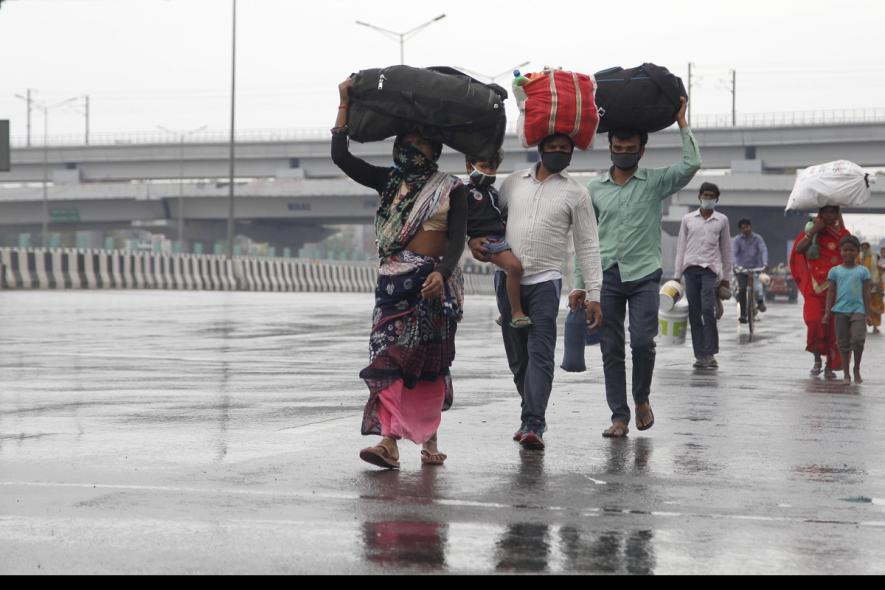With a Low Testing Rate, Bihar Blames Returning Migrants for a Spike in COVID-19 Cases

Image Courtesy: The New Indian Express
Patna: After 277 out of more than 1.8 lakh migrant workers who had arrived in Bihar from other states over the past ten days tested positive for COVID-19, state health department officials and the local media are busy pinning the blame of a spike in cases on the workers.
It seems to be easy for the powers that be to attack the migrant workers who have been put in quarantine centres to check the spread of COVID-19. However, the simple fact is that in a state with an estimated population of nearly 12 crore, the government has tested only 42,000 samples so far, a number which includes the random sampling of migrant workers. Bihar has one of the lowest testing rates in the country since the lockdown began on March 25.
As of Thursday morning, Bihar had 953 confirmed cases of COVID-19, including 74 cases reported on Wednesday and 130 cases on Tuesday.
Without testing the local population on a large scale to gauge the spread of the novel coronavirus, health officials targeted random samples of migrant workers soon after they arrived. And, on the basis of a 0.15% positive testing rate, not a huge proportion by any standards, solely blamed them for the rise of COVID-19 in the state.
According to health experts in Bihar, if migrant workers are targeted as a group for testing, it is understandable that a higher number of cases will emerge since the workers had been left exposed to states with a high number of red zones including Maharashtra, Gujarat and New Delhi.
A health official from the state admitted that migrant workers could have been blamed if there was widespread testing of the local population. However, with no such testing taking place, it is incorrect to say that migrant workers were spreading the virus. “In reality, the government is not in a position to conclude how many local people are positive without conducting testing on a large scale. So far there is no testing taking place,” the official, who wished to stay anonymous, said.
Activists mention that it was unfortunate that the most vulnerable sections of society are being targeted in this way. “The Bihar government is playing a dangerous game by singling out only the migrant workers for a spike in the number of cases. It is being done to hide its failure of not testing even 5 per cent of the local population so far. It is easy to blame the powerless migrant workers. But, after they return to their villages following the completion of their quarantine period, they will have to suffer because of the perception being created,” said Ranjeev, an activist.
On the other hand, the government has claimed that the workers have created a challenge for it and has decided to expand testing facilities and its capacity to combat COVID-19.
Bihar Health Secretary Lokesh Kumar Singh laid the blame at the doorstep of the migrant workers, saying that the sudden rise in cases was due to their arrival in large numbers. Till Wednesday, 332 out of the total 953 cases were migrant workers who had returned during the lockdown period. Of the 332 cases, about 277 cases were those who came to Bihar between May 3 and May 13 and were tested positive during random sampling. “It is more than one third of the total positive cases,” he said.
According to Singh, the migrant workers' return increased the rate of positive cases to 2.32% from between 1.7% to 1.8% in early May. The number of migrant workers who tested positive for the novel coronavirus had doubled over the past three days. Till May 10, about 85 migrant workers had tested positive but the number had risen to 190 on May 12 and was 277 on May 13, he added.
According to officials, out of the 277 that have tested positive, 78 migrant workers had returned from the NCR region which was followed by 71 from Gujarat, 57 from Maharashtra, 20 from West Bengal, 13 from Haryana, six from Uttar Pradesh and Rajasthan, three from Telangana and only a single case from Kerala.
Yogesh Giri, a migrant worker, who is quarantined along with others at the quarantine centre in Dinara town in Rohtas district, said it was wrong to blame them. He said that they had returned from their places of work since they had no option and that the company he worked for had not paid him for April. “The company was closed and we were asked to sit at home. There were no arrangements to help us. No one from the company visited us even to inquire if we were alive or dead without ration and money during a long lockdown,” said Yogesh. He had been working in a factory which manufactured motorcycle parts in Ahmedabad and is a resident of Baruna village in Rohtas.
"We paid Rs 1000 to a broker to get on a special train. We had no option but to return home. All announcements of free trains for migrant workers were nothing but to fool us. Nothing was free, except a bottle of mineral water that was given to us at the time of boarding,” added Yogesh.
Muzaffar Imam, another worker, had been working as an electrician in a factory which manufactures car parts in Ahmedabad. He is currently in a quarantine centre in Haspura in Aurangabad district. “The fear of the coronavirus and hunger forced most of us to come to our native place. Our home is our last hope for survival,” Muzaffar said.
Mukesh Kumar, a migrant worker, had been working in a garment factory in Surat, and is also at the quarantine centre in Haspura. “There was no work. I was sitting idle for nearly two months because the factory was shut down the day lockdown began on March 25. I spent all my savings to survive during the period. There were a lot of problems and a fear of the coronavirus as well,” he added.
Mukesh said that there was no help from any quarter and the situation was such that they managed to survive till they boarded a special train. “There was no chance of getting work to earn a livelihood. What hurt us is that the factory owner hardly helped us,” he added.
As of now, Bihar is conducting 313 tests per million people at its six government-run laboratories, one of the lowest among the states in the country. Keeping this in mind, Chief Minister Nitish Kumar has directed the health department to make arrangements to scale up testing to 10,000 COVID-19 tests per day in the state against the present average daily testing capacity of between 1900 to 2000 samples. Till May 8, the average testing was below 1000 tests per day.
Kumar has made it clear that random testing would not work any longer and asked officials to start intensive tests of migrant workers to break the chain.
So far, over 1.89 lakh migrant workers arrived in the state and they have been put in quarantine centres spread across the state.
Last week, the state government said that there were over 28 lakh stranded migrant workers from the state across the country. Some experts estimate that the number would be between 35 lakh and 40 lakh people.
Interestingly, the state government has no official data of how many workers from Bihar are employed outside the state.
The state government has paid Rs 1000 assistance to more than 19 lakh migrant workers that had called the state helpline. The amount has been deposited in their bank account from the CM special assistance fund.
The state government has decided to curtail the quarantine duration for migrant workers to 14 days instead of 21 days announced earlier.
Get the latest reports & analysis with people's perspective on Protests, movements & deep analytical videos, discussions of the current affairs in your Telegram app. Subscribe to NewsClick's Telegram channel & get Real-Time updates on stories, as they get published on our website.
























